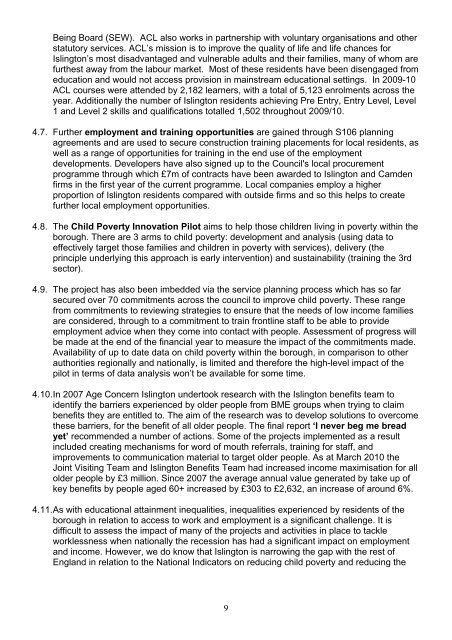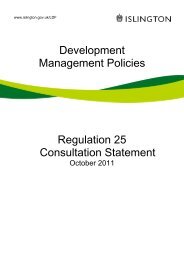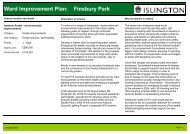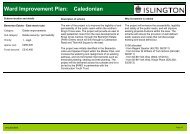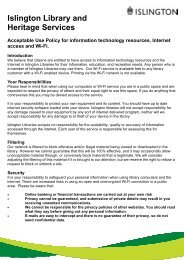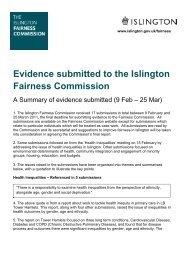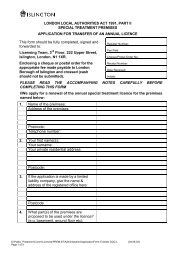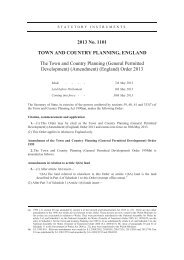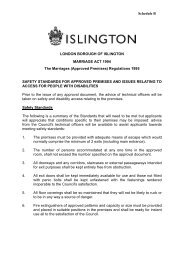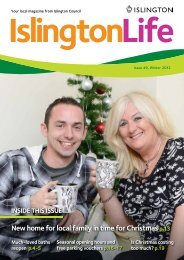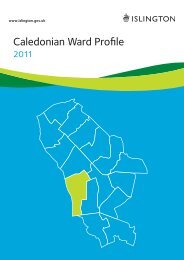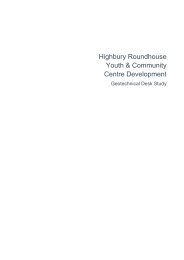Two Islingtons: Understanding the Problem - Islington Council
Two Islingtons: Understanding the Problem - Islington Council
Two Islingtons: Understanding the Problem - Islington Council
Create successful ePaper yourself
Turn your PDF publications into a flip-book with our unique Google optimized e-Paper software.
Being Board (SEW). ACL also works in partnership with voluntary organisations and o<strong>the</strong>r<br />
statutory services. ACL’s mission is to improve <strong>the</strong> quality of life and life chances for<br />
<strong>Islington</strong>’s most disadvantaged and vulnerable adults and <strong>the</strong>ir families, many of whom are<br />
fur<strong>the</strong>st away from <strong>the</strong> labour market. Most of <strong>the</strong>se residents have been disengaged from<br />
education and would not access provision in mainstream educational settings. In 2009-10<br />
ACL courses were attended by 2,182 learners, with a total of 5,123 enrolments across <strong>the</strong><br />
year. Additionally <strong>the</strong> number of <strong>Islington</strong> residents achieving Pre Entry, Entry Level, Level<br />
1 and Level 2 skills and qualifications totalled 1,502 throughout 2009/10.<br />
4.7. Fur<strong>the</strong>r employment and training opportunities are gained through S106 planning<br />
agreements and are used to secure construction training placements for local residents, as<br />
well as a range of opportunities for training in <strong>the</strong> end use of <strong>the</strong> employment<br />
developments. Developers have also signed up to <strong>the</strong> <strong>Council</strong>'s local procurement<br />
programme through which £7m of contracts have been awarded to <strong>Islington</strong> and Camden<br />
firms in <strong>the</strong> first year of <strong>the</strong> current programme. Local companies employ a higher<br />
proportion of <strong>Islington</strong> residents compared with outside firms and so this helps to create<br />
fur<strong>the</strong>r local employment opportunities.<br />
4.8. The Child Poverty Innovation Pilot aims to help those children living in poverty within <strong>the</strong><br />
borough. There are 3 arms to child poverty: development and analysis (using data to<br />
effectively target those families and children in poverty with services), delivery (<strong>the</strong><br />
principle underlying this approach is early intervention) and sustainability (training <strong>the</strong> 3rd<br />
sector).<br />
4.9. The project has also been imbedded via <strong>the</strong> service planning process which has so far<br />
secured over 70 commitments across <strong>the</strong> council to improve child poverty. These range<br />
from commitments to reviewing strategies to ensure that <strong>the</strong> needs of low income families<br />
are considered, through to a commitment to train frontline staff to be able to provide<br />
employment advice when <strong>the</strong>y come into contact with people. Assessment of progress will<br />
be made at <strong>the</strong> end of <strong>the</strong> financial year to measure <strong>the</strong> impact of <strong>the</strong> commitments made.<br />
Availability of up to date data on child poverty within <strong>the</strong> borough, in comparison to o<strong>the</strong>r<br />
authorities regionally and nationally, is limited and <strong>the</strong>refore <strong>the</strong> high-level impact of <strong>the</strong><br />
pilot in terms of data analysis won’t be available for some time.<br />
4.10. In 2007 Age Concern <strong>Islington</strong> undertook research with <strong>the</strong> <strong>Islington</strong> benefits team to<br />
identify <strong>the</strong> barriers experienced by older people from BME groups when trying to claim<br />
benefits <strong>the</strong>y are entitled to. The aim of <strong>the</strong> research was to develop solutions to overcome<br />
<strong>the</strong>se barriers, for <strong>the</strong> benefit of all older people. The final report ‘I never beg me bread<br />
yet’ recommended a number of actions. Some of <strong>the</strong> projects implemented as a result<br />
included creating mechanisms for word of mouth referrals, training for staff, and<br />
improvements to communication material to target older people. As at March 2010 <strong>the</strong><br />
Joint Visiting Team and <strong>Islington</strong> Benefits Team had increased income maximisation for all<br />
older people by £3 million. Since 2007 <strong>the</strong> average annual value generated by take up of<br />
key benefits by people aged 60+ increased by £303 to £2,632, an increase of around 6%.<br />
4.11. As with educational attainment inequalities, inequalities experienced by residents of <strong>the</strong><br />
borough in relation to access to work and employment is a significant challenge. It is<br />
difficult to assess <strong>the</strong> impact of many of <strong>the</strong> projects and activities in place to tackle<br />
worklessness when nationally <strong>the</strong> recession has had a significant impact on employment<br />
and income. However, we do know that <strong>Islington</strong> is narrowing <strong>the</strong> gap with <strong>the</strong> rest of<br />
England in relation to <strong>the</strong> National Indicators on reducing child poverty and reducing <strong>the</strong><br />
9


